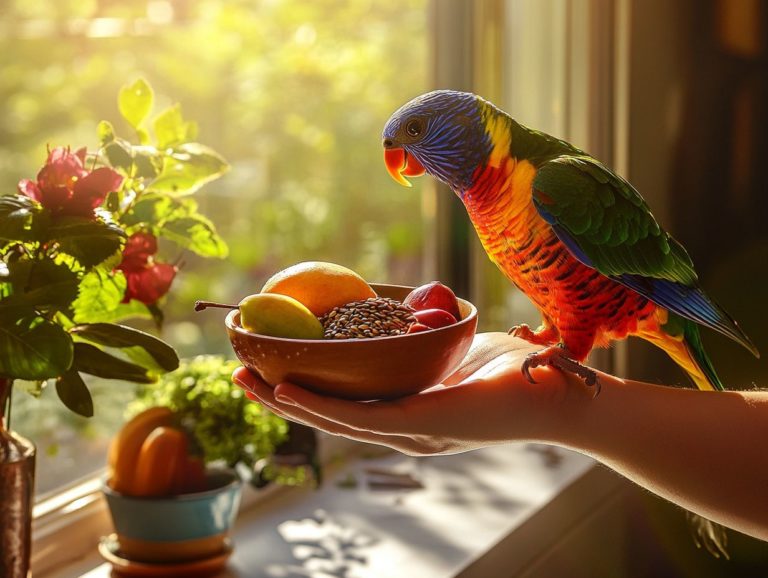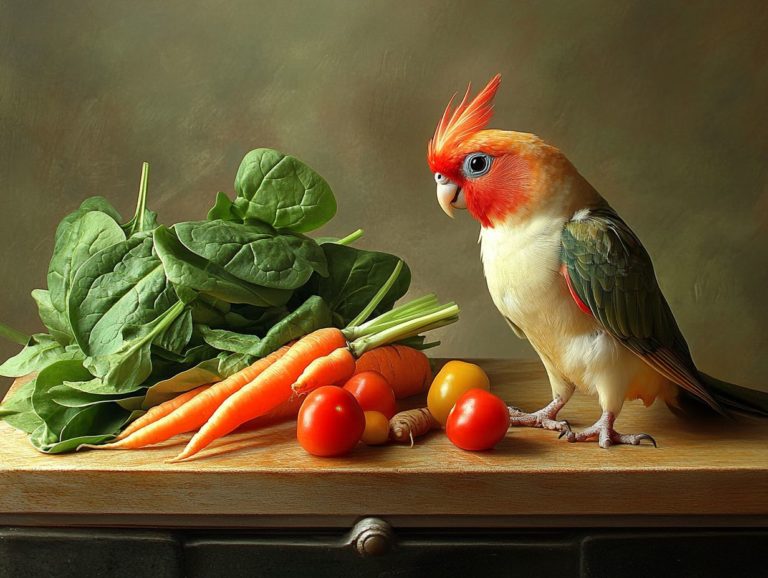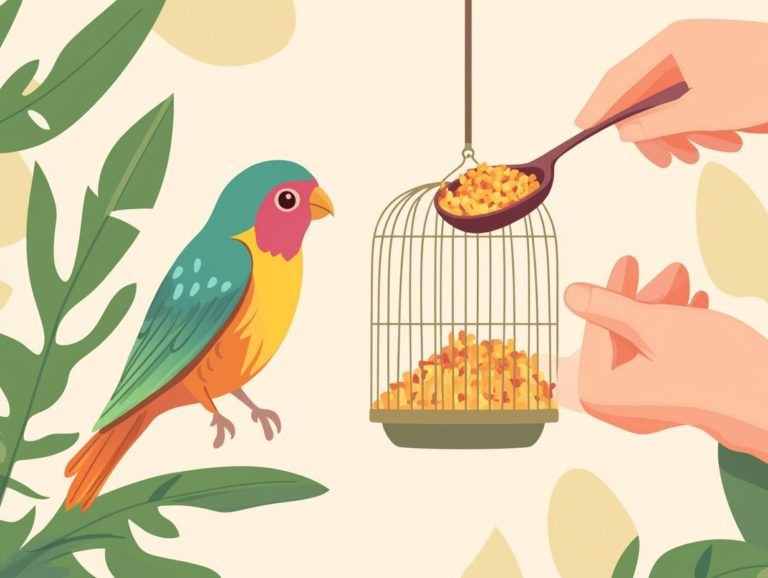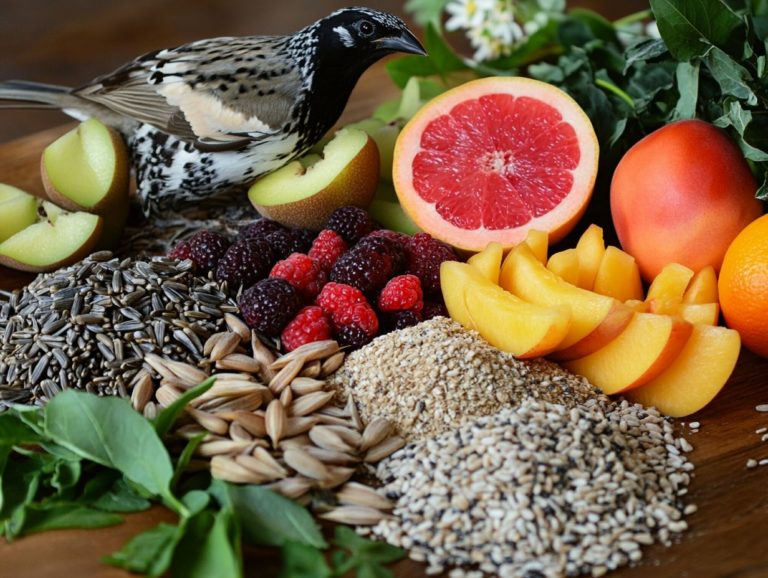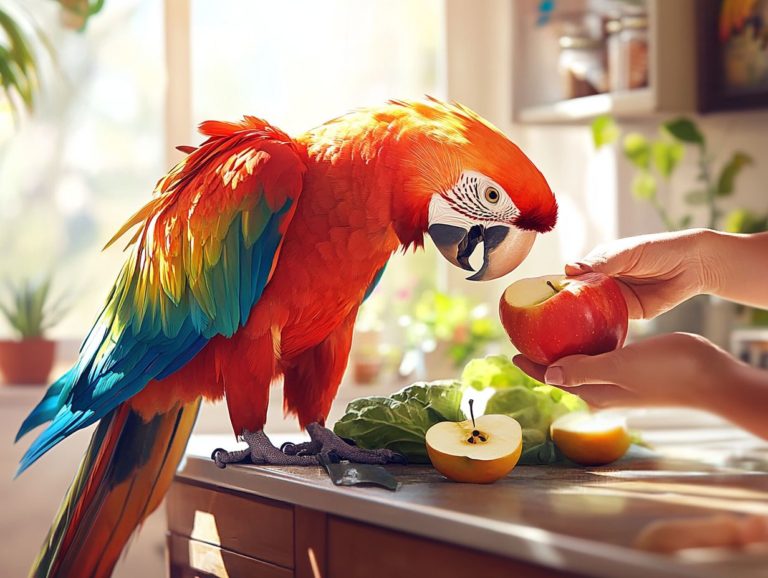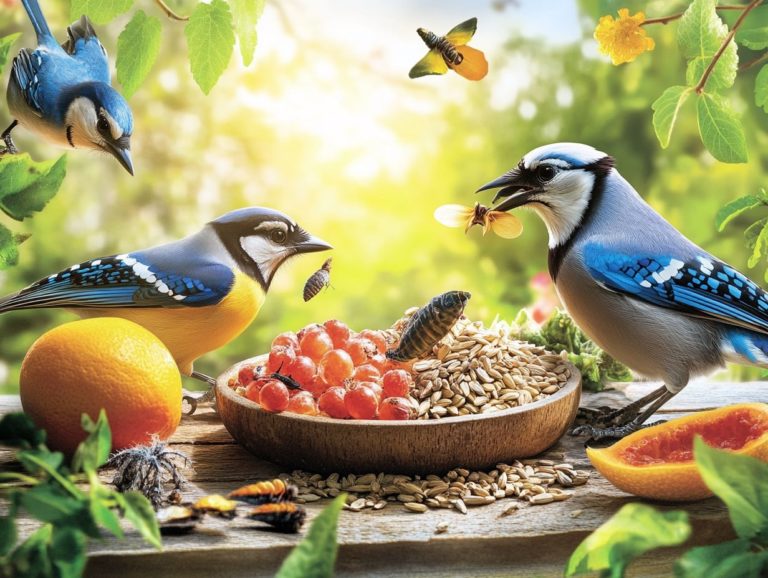Common Bird Food Myths Debunked
Birdwatching and backyard feeding can be a truly delightful way to connect with nature. Yet, misconceptions about bird diets often cloud your understanding.
You might find yourself believing common myths, like the notion that bread is a nutritious choice or that all birds thrive solely on seeds. This article addresses five prevalent bird food myths and reveals the truth behind each one.
By uncovering these misconceptions, you ll gain valuable insights that will enhance your feeding practices and contribute to the health and well-being of your feathered friends.
Contents
Key Takeaways:
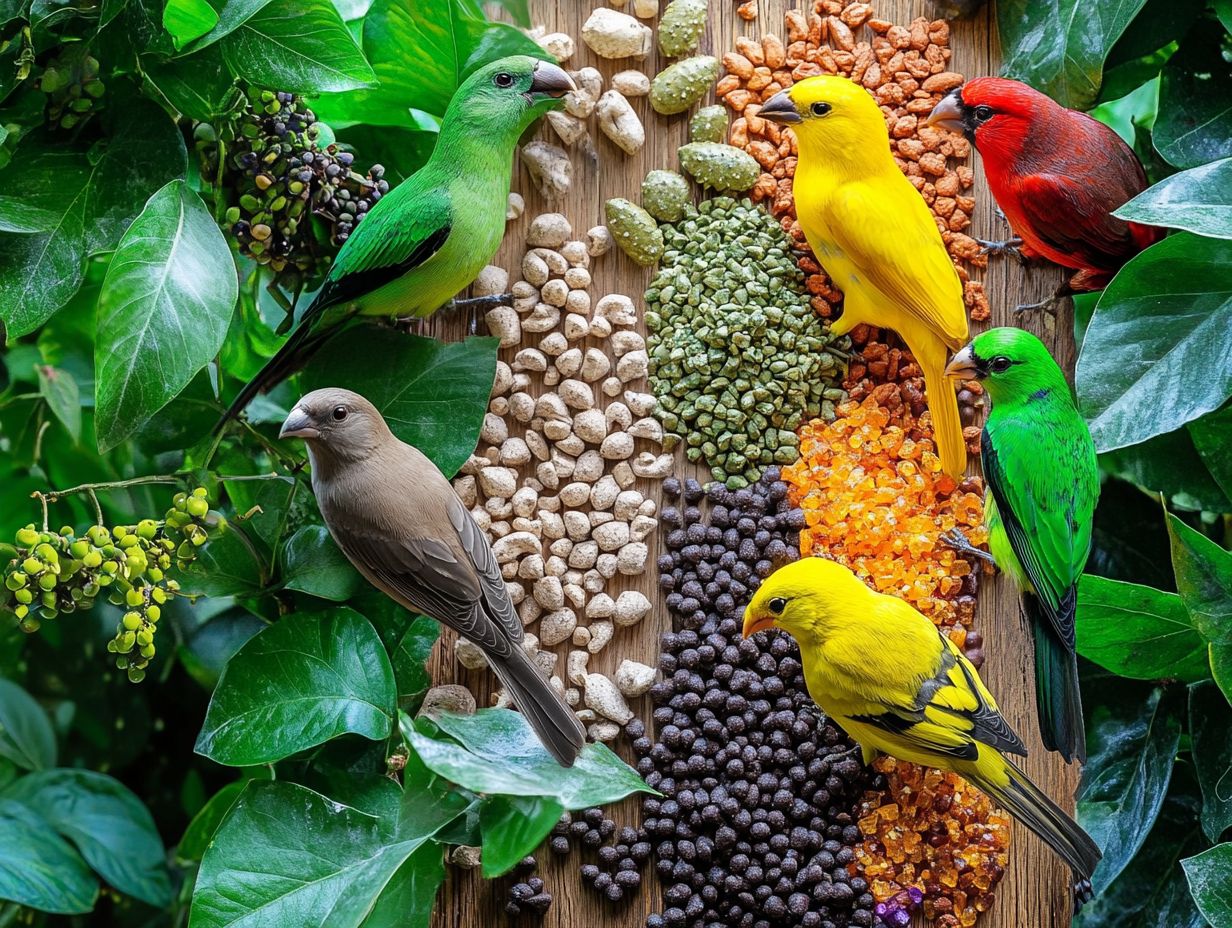
- Bread is not a nutritious option for birds and can actually be harmful to their health.
- A varied diet is important for birds, and they should not solely rely on seeds as their main source of food.
- While insects play a role in a bird’s diet, they are not the only source of nutrition, and some birds may not even eat them at all.
What are Bird Food Myths?
Bird food myths can seriously affect the health and well-being of wild birds. These misconceptions shape your feeding practices and food choices. You might be unknowingly spreading them, which could have negative consequences for bird species, especially during critical times like winter when food is scarce.
Understanding these myths is essential for bird conservation and can enhance your bird feeding practices to better meet the nutritional needs of various species, including American Goldfinches and robins. Let’s dive into common myths about pet birds and uncover the truth now!
Misinformation about bird diets can lead to poor food choices, resulting in poor diets that make it hard for birds to stay healthy. For example, the belief that feeding bread is harmless can actually lead to health problems stemming from a poor diet.
These misconceptions can also influence birds’ natural behaviors. Some species may become overly reliant on food provided by humans, disrupting their natural foraging instincts. By uncovering the truth behind these common myths, you can create an environment that promotes healthy, instinctive feeding behaviors while contributing to the broader goal of bird conservation.
With accurate information, you have the power to play a crucial role in enhancing bird health and ensuring a more sustainable coexistence with these captivating creatures.
Myth #1: Bread is Good for Birds
The notion that bread is an appropriate food for birds is a widespread misconception that can greatly jeopardize their health and well-being. While it may be tempting to toss some bread to ducks and other wild birds, it simply doesn t provide the necessary nutritional value they require, particularly when it comes to calcium.
Insufficient nutrition can lead to serious health issues for bird species like Blue Jays and robins, especially during the winter months when their energy reserves are crucial for survival.
Why Bread is Not a Nutritious Option
Bread simply doesn t cut it when it comes to nourishing birds; it lacks the essential nutritional value that they need for optimal health. You might think you’re doing them a favor by tossing out some bread, but this well-intentioned gesture can actually foster a reliance on human-provided food.
Instead of encouraging birds to engage in their natural foraging behaviors and seek out a diverse diet, they may end up expecting easy handouts. In reality, bread offers little more than empty calories, devoid of the vital vitamins and minerals that wild birds need to thrive.
A varied diet rich in seeds, fruits, and insects delivers a broader spectrum of nutrients, while bread can lead to nutritional deficiencies that jeopardize a bird’s immune system and overall vitality. Poor nutrition doesn t just impact individual birds; it can manifest in behavioral issues like lethargy and reduced reproductive success, ultimately affecting the entire bird community.
With a lack of dietary variety, birds become more vulnerable to diseases, which can significantly lower their survival rates. By promoting better feeding practices, you not only enhance the health of individual birds but also contribute to a balanced ecosystem that benefits all.
Join us in promoting healthier feeding habits that benefit our feathered friends!
Myth #2: Birds Can Only Eat Seeds
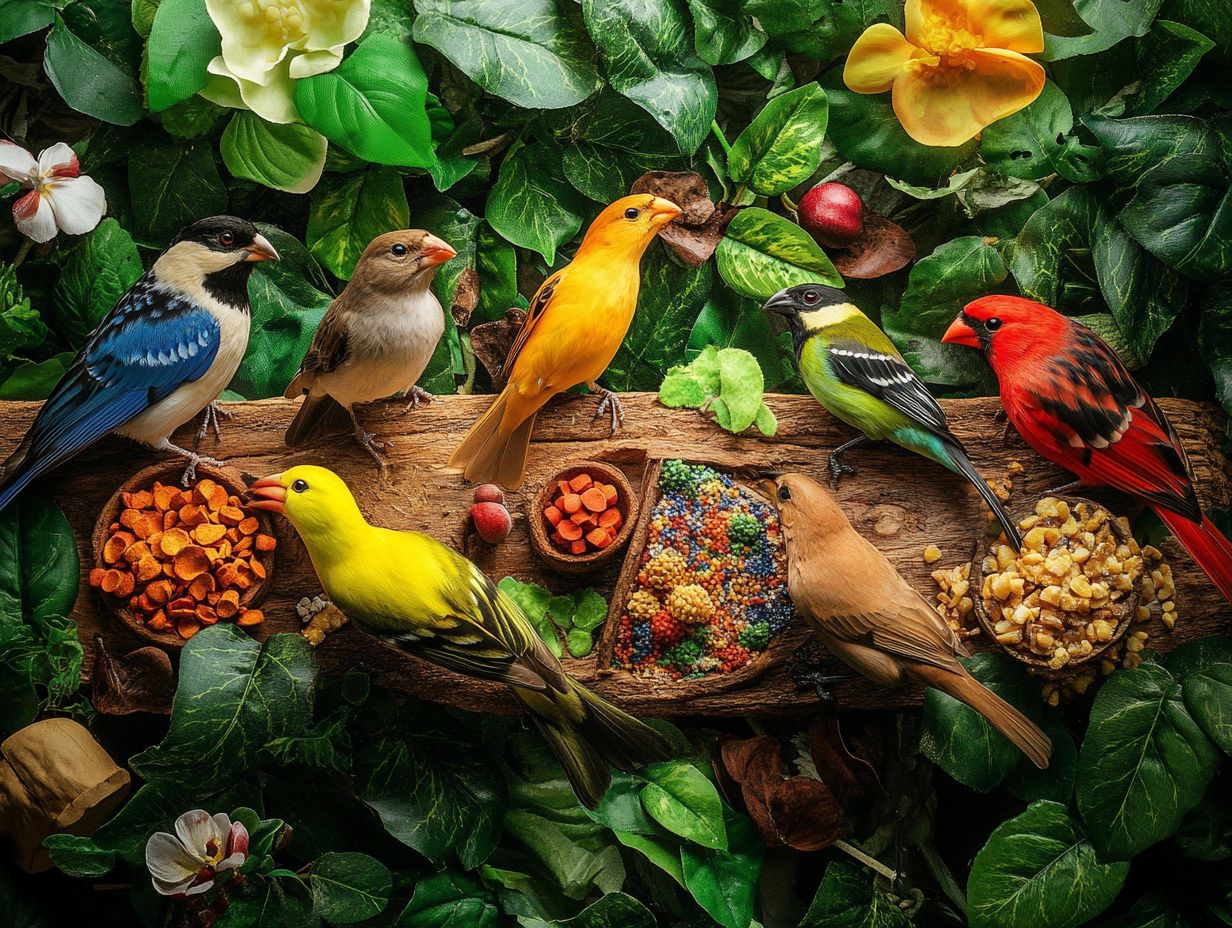
The idea that birds rely exclusively on seeds for their diet is a common misconception. This myth fails to appreciate the rich dietary diversity found among different bird species. While seed feeders may capture the attention of avid birdwatchers, it s essential to acknowledge that wild birds thrive on a varied diet that includes fruits, insects, and even delectable homemade bird food alternatives, such as mixtures with peanut butter.
A mix of foods keeps our feathered friends healthy and happy! This nutritional variety plays a vital role in supporting their health, feeding strategies, and how birds find and gather food in nature, especially during crucial periods like migration.
The Importance of a Varied Diet
A varied diet is essential for bird health, as it offers vital nutrients that seed-only diets simply can’t provide. By incorporating a range of food sources like fruits, nuts, and insects you can effectively meet the nutritional needs of various bird species. This is especially important during those chilly winter months when energy reserves are crucial.
As a birdwatcher, elevate your hobby by understanding and implementing diverse feeding strategies that align with the dietary preferences of your feathered visitors. In addition to seeds, offer suet to attract insectivorous birds like woodpeckers and nuthatches. Sliced apples or berries are irresistible to fruit-loving thrushes and warblers. A mix of nuts, such as sunflower seeds and peanuts, can entice a delightful variety of finches and cardinals, allowing them to flourish.
By promoting such varied feeding practices, you not only enhance the well-being of your feathered guests but also enrich your own birdwatching experience. Observing the different species drawn to your nourishing offerings becomes a rewarding adventure in itself. Start diversifying your bird feeders today and watch your backyard come alive with activity!
Myth #3: Birds Need to Eat Insects
The notion that birds rely primarily on insects for sustenance is a myth that oversimplifies their intricate dietary needs. While it s true that insects play a vital role in the diets of many bird species offering a rich source of protein, particularly during breeding seasons it s essential to recognize that numerous birds also flourish on a diverse array of seeds, fruits, and other food sources tailored to their unique nutritional requirements and feeding behaviors.
Understanding this complexity allows for a deeper appreciation of avian diets.
The Role of Insects in a Bird’s Diet
Insects are crucial for your garden’s ecosystem, serving as a significant source of protein for many bird species, especially during the breeding season. However, relying solely on insects overlooks the broader nutritional needs that various birds have. A balanced diet, rich in seeds and fruits alongside insects, is essential for optimal bird health.
During critical periods like the fledging stage, young birds require a diverse array of nutrients to support their growth and development. This makes it imperative that their diet includes not just protein from insects, but also carbohydrates, vitamins, and minerals from other food sources. Neglecting these nutritional requirements can lead to deficiencies that impair their survival and reproductive success. Birds thrive on a variety of foods, so ensuring they have access to a well-rounded diet helps counteract the risks posed by misinformation regarding their dietary needs.
By educating yourself and other bird enthusiasts about these facts, you contribute to healthier bird populations and help dispel dietary misconceptions that could otherwise limit their well-being.
Myth #4: All Birds Eat the Same Food
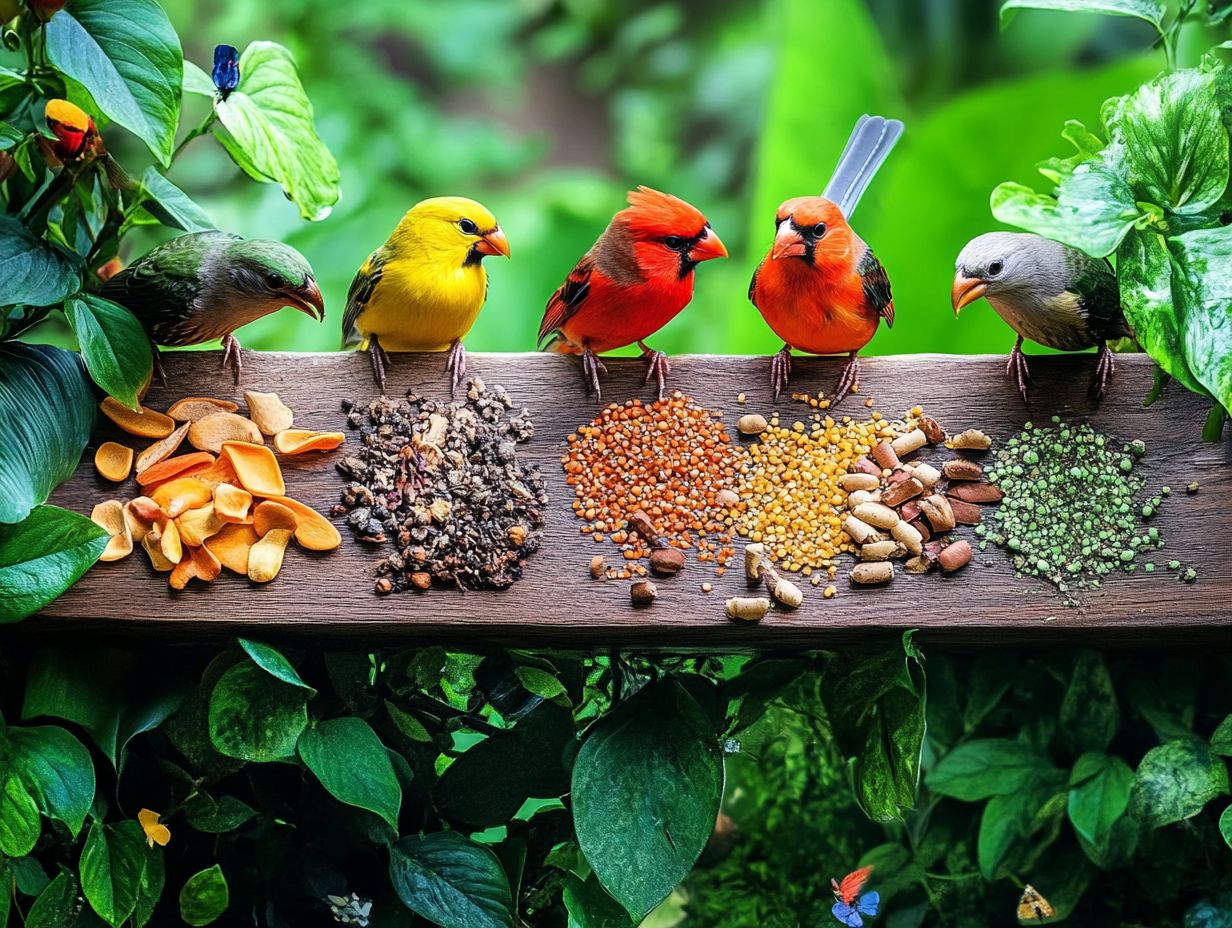
The notion that all birds share the same diet is a myth that overlooks the rich tapestry of dietary needs and preferences across different bird species. Consider the unique eating habits of robins, waxwings, and American Goldfinches; each reflects their specific environment, migration patterns, and nutritional requirements.
This delightful diversity calls for tailored feeding practices, ensuring that you effectively support the health and well-being of these remarkable avians.
Differences in Diets Among Bird Species
Understanding the dietary differences among bird species is essential for birdwatching. It also helps improve your feeding strategies.
For instance, while some birds thrive primarily on seeds, others may depend significantly on fruits or insects, influenced by their habitats and ecological roles.
This variation not only shapes their foraging behaviors but also affects their social interactions and nesting habits. Take woodpeckers, for example; their insect-foraging drilling behaviors in tree bark play a vital role in maintaining forest health by controlling pest populations.
On the other hand, nectar-feeding species like hummingbirds are key pollinators, contributing to the reproduction of diverse flowering plants.
By diving into these dietary preferences, you empower conservationists to craft targeted feeding initiatives. This ensures that specific bird species have access to the right foods that nurture their unique habitats and ecological functions.
Myth #5: Feeding Birds Will Make Them Dependent on Humans
The notion that feeding birds will render them dependent on humans is a common concern that may dissuade you from embracing the practice. However, when approached thoughtfully, feeding birds can significantly enhance their health and well-being, particularly during challenging seasons such as winter.
By adopting proper feeding strategies, you can encourage birds to add to their diets while still relying on their natural food sources. This ensures they maintain their instinctual foraging behaviors.
The Truth About Feeding Wild Birds
Feeding wild birds, when done thoughtfully, can greatly enhance their health and survival, particularly in tough conditions.
While there may be concerns about creating bird dependence, providing appropriate food sources can genuinely boost their energy levels and nutritional intake. This is especially true for species like feeding ducks and migratory birds during critical transition periods.
As a birdwatcher, you have the power to cultivate a thriving environment for these avian species by embracing effective feeding practices.
By choosing high-quality foods like seeds, fruits, and nuts, you can cater to the diverse dietary needs of various bird species. For example, offering suet or mealworms can attract insect-eating birds, while sunflower seeds will draw in a delightful array of songbirds.
It s essential to keep your feeders clean and well-maintained to prevent the spread of disease.
With this mindful approach, you get to enjoy the beauty of these stunning birds while making a positive impact on their lives!
Frequently Asked Questions
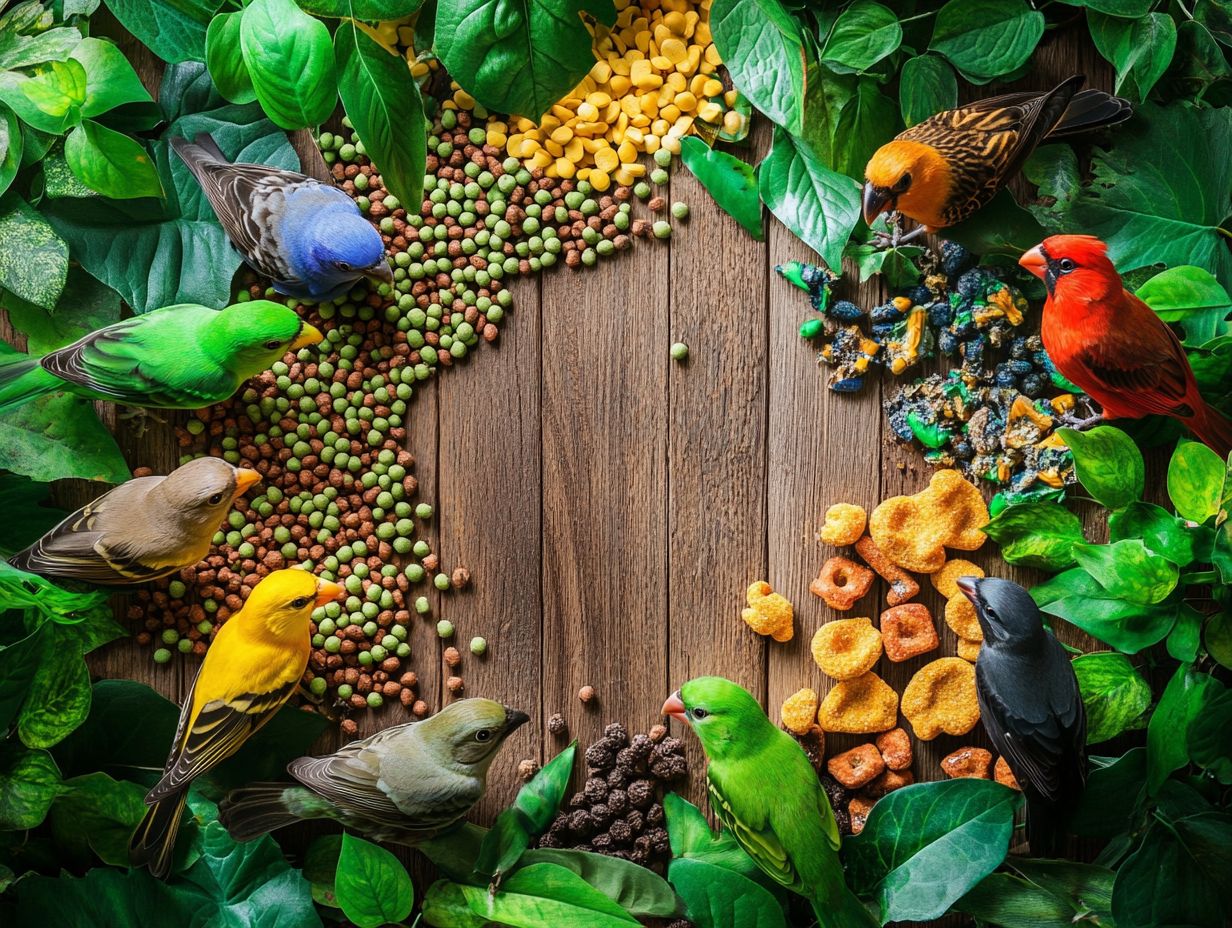
What are some common feeding myths about bird food?
Some common bird food myths include the idea that all birds eat the same food, that bread is a good food for birds, and that birds only need to eat in the winter. It’s also important to be aware of common myths about bird adoption that can affect their care.
Is it true that all birds eat the same food?
No, this is a common misconception. Each bird species has its own unique dietary needs and preferences, so not all birds will eat the same food.
Can birds eat bread?
Bread is not a healthy food for birds. It lacks the necessary nutrients to keep them healthy and can even lead to health problems in birds.
Do birds only need to eat in the winter?
No, birds need to eat year-round to maintain their energy and health. In fact, some birds migrate in the winter and need extra food to fuel their long journeys.
Should I only use bird food to feed birds?
No, while birdseed is a common food for birds, it’s important to provide a variety of foods to attract a diverse range of bird species to your yard. This can include fruits, nuts, and insects.
Is it true that birds don’t need water if they are eating snow?
No, birds still need a source of fresh water even if they are eating snow. Eating snow will not provide them with enough hydration and can actually cause them to lose body heat.

